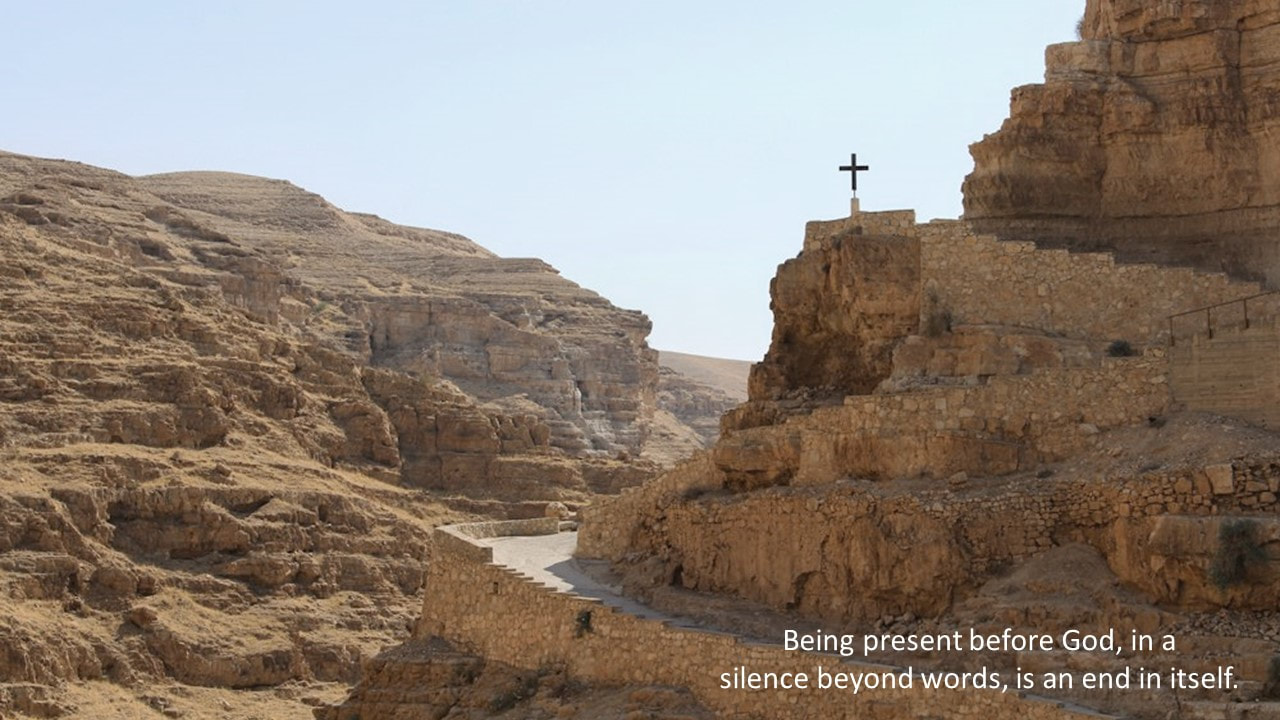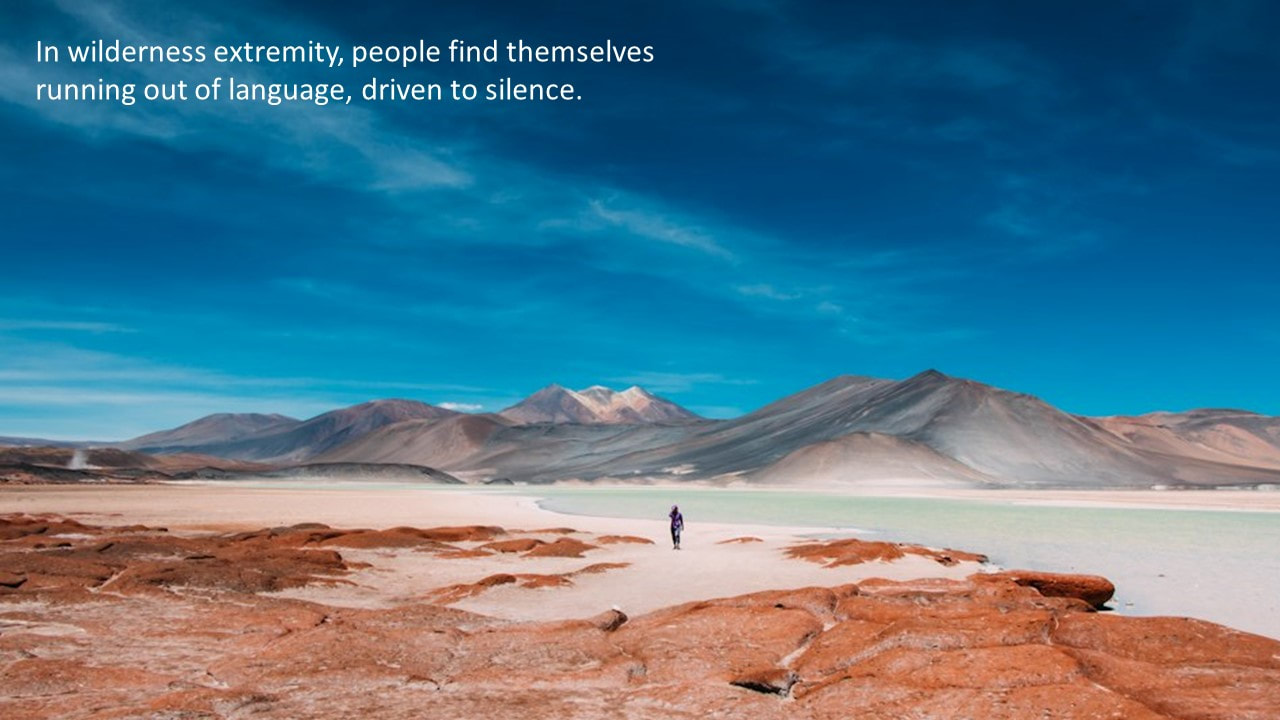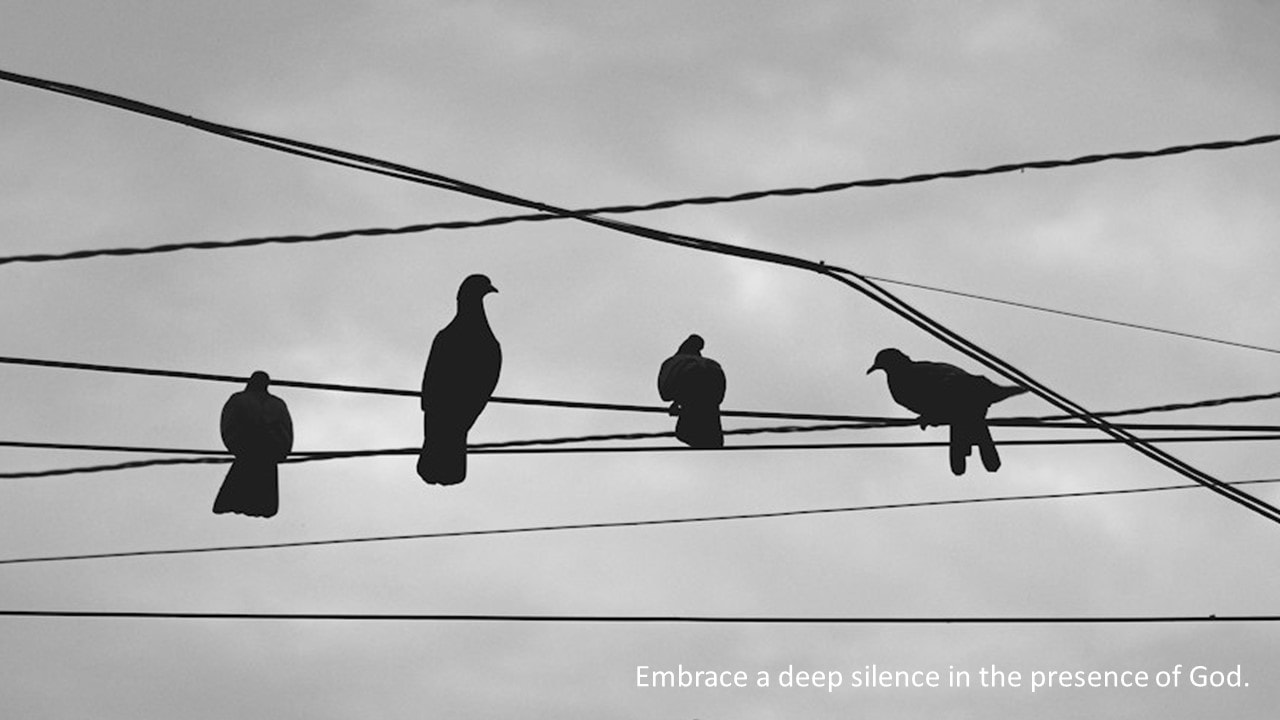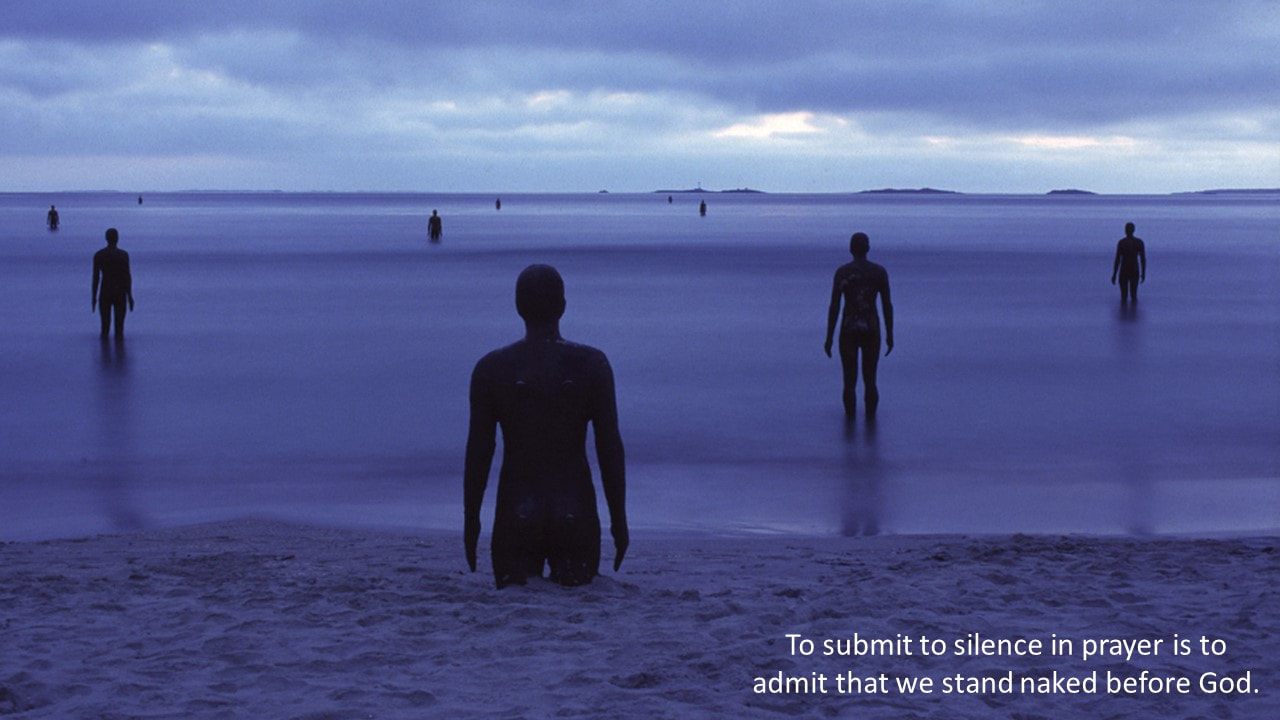The first week of each month has a short, image-backed quote with links to associated resources in the text below it. In other weeks, the short quote is taken from a longer one by the month's author, found below the image. The last week of the month has a short quote and questions to encourage reflection on all the month's quotations and images.
Belden Lane, our author for February, is a tree-climbing, ecology-loving friend of animals and wild landscapes, whose passion for what nature has to teach us about spirituality shimmers through his books - each with titles that convey his deep affinity with creation.
Read more about Belden Lane's book, The Solace of Fierce Landscapes: Exploring Desert and Mountain Spirituality (Oxford University Press, 1998), from which this month's quotes are taken, by clicking here.
Read more about Belden Lane's book, The Solace of Fierce Landscapes: Exploring Desert and Mountain Spirituality (Oxford University Press, 1998), from which this month's quotes are taken, by clicking here.
|
Guided Meditation to use with short and long quotes:
For a 5 minute audio guided meditation to use with each week's quote, click the play button on the image. To pause, and restart, click in the same place. To see the image full screen as you listen, click the expand screen icon in the corner. |
|
|
Lectio Divina to use with longer quotes:
For an audio guided Lectio Divina to use with this week's longer quote, click the play button on the image. Allow 10-15 minutes for this practice. To pause, and restart, click in the same place. For a text version of the Lectio Divina meditation, click the button. |
|
Monday 5th February, 2024
Belden Lane, The Solace of Fierce Landscapes: Exploring Desert and Mountain Spirituality (Oxford University Press, 1998), 12.
Image: Iva Rajović, unsplash.com/@eklektikum
This short image-backed quote is from Belden Lane's book, The Solace of Fierce Landscapes: Exploring Desert and Mountain Spirituality (Oxford University Press, 1998), 12. To read more about this book, click here.
Belden Lane was born in 1943 and studied theology at Princeton University, completing his PhD there in the mid 1970s. A Presbyterian, for several decades he was Professor of Theological Studies, American Religion, and History of Spirituality at the Roman Catholic St Louis University, Missouri, but is now retired. As with some people who engage deeply in a spirituality rooted in silence and apophatic theology, information about him is not easy to come by: he keeps a humble, low profile. Dig a little deeper and you find that his interests include the relationship between faith and geography, solitary backpacking in wilderness places, storytelling, the poetry of Rumi, working with men to discover a more authentic masculinity (more on this below!) and exposing students to issues of urban poverty through the Catholic Worker community.
Lane is the author of a string of acclaimed and profoundly insightful books about the intersection of nature, theology and spirituality. Wonderfully enticing titles include his most recent book, The Great Conversation: Nature and the Care of the Soul (OUP, 2019), which has been described as a 'multi-faceted treatise on a spiritually centered environmentalism', in which he asserts that nature is our teacher and we must recover the great conversation of former ages between all creatures and creation for the sake of the future of our planet; Backpacking with the Saints: Wilderness Hiking as Spiritual Practice (OUP, 2014), is the story of Belden's solitary spiritual trek through the Ozark Mountains in Kansas, and across the South West of America, with a selection of texts by the world's great spiritual masters as his companions; or Desert Spirituality and Cultural Resistance: From Ancient Monks to Mountain Refugees (OUP, 2011), which explores wilderness in the spiritual life. You can see a full list of his books, and a link to them all, here. All are lengthy and deep.
For those with less time, but who would like to access a little more of Belden Lane's writings, try these four essays from The Christian Century magazine, which has been publishing thoughtful, independent and progressive reports, commentary, poetry and essays on faith life in a pluralist society since 1900 - see here. Or there are another nine from the same publication, going back to 1982 - including one called 'Holy Silence' - here. And there's an article for the Huff Post, 'A Passionate, Green Calvinism', written in 2011, here.
You can hear Belden Lane talking himself about the themes of The Great Conversation in a 55 minute podcast entitled 'Finding God in Wild Places', here, recorded by the Sophia Society who provide materials that encourage exploration of the divine beyond traditional religious boundaries, and developing an 'expansive faith that transcends dualism, embraces diversity, cultivates transformative community and radically embodies love.' Or, for a shorter podcast of 35 minutes, try here, and listen to his Soul Care Conversation, 'Nature and the Care of the Soul', for Potter's Inn, a nonprofit, web-based organisation which offers 'Caring for the souls of those in ministry and the marketplace'.
Belden's LinkedIn profile describes him as a 'Wilderness Backpacker & Writer, Retreat Leader and Wisdom Elder with Illuman.org', which is a global non-profit committed to helping men become healthier and more authentic: see here.
Monday 12th February, 2024
Belden Lane, The Solace of Fierce Landscapes: Exploring Desert and Mountain Spirituality (Oxford University Press, 1998), 39.
Image: diego jimenez, London, Unsplash.com/@diegojimenez
The short, image-backed quote, above, is taken from this week's longer quote, below, in Belden Lane's The Solace of Fierce Landscapes: Exploring Desert and Mountain Spirituality (Oxford University Press, 1998), 39-40.
For more about this book, click here.
|
Listen to this week's longer quote:
To listen to the longer quote, below, being read, click the play button on the small version of the image next to or below this text. To see the image full screen as you listen, click the expand screen icon in the corner. |
|
'In wilderness extremity, people find themselves running out of language, driven to silence. Ordinary speech seems inappropriate. Mountain and desert people do not talk much. Their words are measured by the leanness of the land. In short, the liminality of the desert and mountain terrain redefines every boundary giving shape to one’s life. … In stretching the self to its edges, the geography helps in forcing a breakthrough to something beyond all previously conceived limits of being. …
The severity of desert and mountain travel has a significant effect on the way people perceive what they experience there. Yet on the other hand, as psychogeographers remind us, the external landscape is also a projected map of internal states of consciousness. “We project psychic contents outward onto the social and physical world and act as though what is projected is in fact an attribute of the other or outer.”* We imagine the desert, for example, to be possessed of the inherent hostility and malevolence many tend to associate with it, when of course the desert itself remains wholly disinterested, neither hateful nor loving. We simply respond to a projection of our own fearfulness.
The interaction of these two realities — the physical stress posed by a rugged environment and the interior interpretative process of the psyche — can result in a wide range of psychological and spiritual experience. … Such experiences of a “sensed presence” in unusual environments, from Moses on Mount Sinai to solitary sailors circumnavigating the globe, do not have to be interpreted as psychiatric aberrations. They exemplify the highly imaginative convergence of threatening terrain and the rich vulnerability of the human spirit in the face of the unknown.'
*Howard Stein, Developmental Time, Cultural Space: Studies in Developmental Psychogeography (University of Oklahoma Press, 1987), 15.
Monday 19th February, 2024
Belden Lane, The Solace of Fierce Landscapes: Exploring Desert and Mountain Spirituality (Oxford University Press, 1998), 66.
Image: Marwan Ahwad, Bangladesh, unsplash.com/@marwan15
The short, image-backed quote, above, is taken from this week's longer quote, below, in Belden Lane's The Solace of Fierce Landscapes: Exploring Desert and Mountain Spirituality (Oxford University Press, 1998), 39-40.
For more about this book, click here.
The short, image-backed quote, above, is taken from this week's longer quote, below, in Belden Lane's The Solace of Fierce Landscapes: Exploring Desert and Mountain Spirituality (Oxford University Press, 1998), 39-40.
For more about this book, click here.
|
Listen to this week's longer quote:
To listen to the longer quote, below, being read, click the play button on the small version of the image next to or below this text. To see the image full screen as you listen, click the expand screen icon in the corner. |
|
'People worn out by cheap language have found themselves drawn to contemplation, moving beyond an excess of words to an emptiness where God is met in silence. …
Christian prayer has traditionally involved a four-step pattern, moving back and forth from a dependence upon language to an abandonment of words altogether. Prayer begins with lectio, the practice of spiritual reading in the scriptures and classic Christian texts. From there one turns to meditatio (the ruminative reflection on what has been read) and oratio (an expression of praise and intercession growing from that reflection). These, in turn, lead to a fourth form of prayer, contemplatio, in which one passes beyond all words and images of the earlier stages to embrace a deep silence in the presence of God. This is where apophatic prayer begins, but not where it ends. Never becoming a goal in itself, apophatic prayer serves ultimately to recycle the process, moving back through the earlier stages in a dynamic rediscovery of the word.
We can summarize the principle themes of the apophatic tradition by tracing them as movements within the life of contemplative prayer. They begin with an embrace of silence—relinquishing language, along with its powers of naming, entitling, and possession. This leads, in turn, to the letting go of one’s thoughts, the emptying of the self, the act of loving in silent contemplation what cannot be rationally understood, even a new freedom with respect to others and one’s life in the world. …
The recovery of the apophatic tradition at the end of the twentieth century is part of a much larger distrust of words in our culture. It is an effort to quell the verbiage that limits genuine discussion of what is most important.'
'People worn out by cheap language have found themselves drawn to contemplation, moving beyond an excess of words to an emptiness where God is met in silence. …
Christian prayer has traditionally involved a four-step pattern, moving back and forth from a dependence upon language to an abandonment of words altogether. Prayer begins with lectio, the practice of spiritual reading in the scriptures and classic Christian texts. From there one turns to meditatio (the ruminative reflection on what has been read) and oratio (an expression of praise and intercession growing from that reflection). These, in turn, lead to a fourth form of prayer, contemplatio, in which one passes beyond all words and images of the earlier stages to embrace a deep silence in the presence of God. This is where apophatic prayer begins, but not where it ends. Never becoming a goal in itself, apophatic prayer serves ultimately to recycle the process, moving back through the earlier stages in a dynamic rediscovery of the word.
We can summarize the principle themes of the apophatic tradition by tracing them as movements within the life of contemplative prayer. They begin with an embrace of silence—relinquishing language, along with its powers of naming, entitling, and possession. This leads, in turn, to the letting go of one’s thoughts, the emptying of the self, the act of loving in silent contemplation what cannot be rationally understood, even a new freedom with respect to others and one’s life in the world. …
The recovery of the apophatic tradition at the end of the twentieth century is part of a much larger distrust of words in our culture. It is an effort to quell the verbiage that limits genuine discussion of what is most important.'
Monday 26th February, 2024
Belden Lane, The Solace of Fierce Landscapes: Exploring Desert and Mountain Spirituality (Oxford University Press, 1998), 68.
Image: Anders Harbo, flickr.com/photos/anders_3/1432220412,
Anthony Gormley’s ‘Another Place’, at Sola, Norway, prior to Crosby Beach.
Anthony Gormley’s ‘Another Place’, at Sola, Norway, prior to Crosby Beach.
The last week of each month offers some questions to help you reflect further on its quotations and images, and how they resonate with your own spiritual journey and relationship with God.
You can engage with these using the written text or the audio version of the questions, below.
The last week of each month offers some questions to help you reflect further on its quotations and images, and how they resonate with your own spiritual journey and relationship with God.
You can engage with these using the written text or the audio version of the questions, below.
|
Listen to the reflection questions:
To listen to the reflection questions, below, being read, click the play button on the Reflect ... image next to or below this text. To see the image full screen as you listen, click the expand screen icon in the corner. |
|
Reflection questions:
Before reflecting on this month's quotes and images, take time to re-ground yourself in your body.
Perhaps take a few slow breaths, feel your feet on the floor and be aware of how your body feels in this moment.
1) Read back over or listen again to this month's quotes and spend time looking at their associated images. As you do so, note a phrase or image that draws your attention. If this is a phrase, you might like to write this out in a journal or on a piece of paper where you will see it regularly. Consider reading aloud several times what you have written to help the words sink more deeply into your heart. If an image resonates with you, let your gaze rest lightly on it for a couple of minutes, allowing it to speak to your heart. Consider using it as a screensaver for a while, or perhaps print it out and place it somewhere that you will see it often.
2) What emerges as you sit with the phrase or image that attracted your attention? Does a new insight or a question, emotion or sensation arise? Take some time to write down and ponder on whatever you notice.
3) Where can you see hope in the midst of what is emerging in you, for yourself, your neighbour, your community, or the planet? How might this impact your daily life and those with whom you share it?
4) In the days and weeks to come, how can you stay open to what you have discovered from your reflections?
Take some time to give thanks for the hope that you have found in this month's quotes and images.
Before reflecting on this month's quotes and images, take time to re-ground yourself in your body.
Perhaps take a few slow breaths, feel your feet on the floor and be aware of how your body feels in this moment.
1) Read back over or listen again to this month's quotes and spend time looking at their associated images. As you do so, note a phrase or image that draws your attention. If this is a phrase, you might like to write this out in a journal or on a piece of paper where you will see it regularly. Consider reading aloud several times what you have written to help the words sink more deeply into your heart. If an image resonates with you, let your gaze rest lightly on it for a couple of minutes, allowing it to speak to your heart. Consider using it as a screensaver for a while, or perhaps print it out and place it somewhere that you will see it often.
2) What emerges as you sit with the phrase or image that attracted your attention? Does a new insight or a question, emotion or sensation arise? Take some time to write down and ponder on whatever you notice.
3) Where can you see hope in the midst of what is emerging in you, for yourself, your neighbour, your community, or the planet? How might this impact your daily life and those with whom you share it?
4) In the days and weeks to come, how can you stay open to what you have discovered from your reflections?
Take some time to give thanks for the hope that you have found in this month's quotes and images.
|
To request the weekly 'Quoting Silence: A month with ...' emails each Monday, with links to the month's author page on the website, click this button.
|
|
To return to the 'Quoting Silence: A month with ...' Collection, click this button.
|





